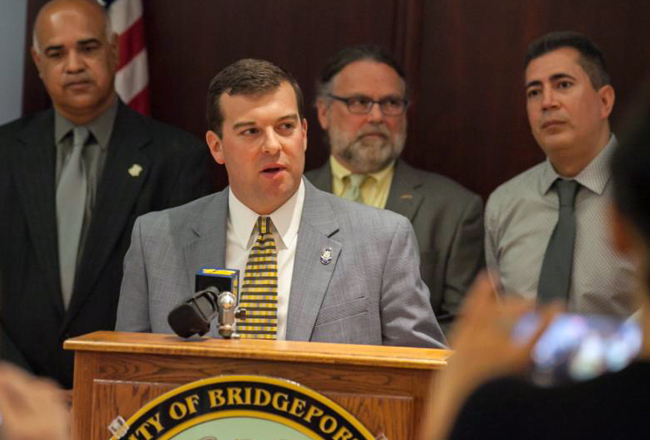The issue legalizing recreational marijuana has been bouncing around the Connecticut Legislature for several years, but lawmakers on both sides of the political aisle believe it may become a reality in 2019.
“I expect we will have a very different debate and discussion this year than we have in years past,” said state Rep. Steve Stafstrom, a Democrat representing Bridgeport. As the House chair of the Judiciary Committee this year ”” he replaced Rep. William Tong of Stamford, who ran successfully for state attorney general ”” Stafstrom”™s will be a key voice in the discussions.

“I expect a robust debate on the issue ”” not just should it or should it not be legal, but about the framework of how we (legalize) it in a responsible way,” he said.
Stafstrom is one of 40 House members to sponsor HB 5595, which would authorize and regulate the retail sale and adult use of marijuana in the state. The legislation includes: a requirement that consumers transport the product in a sealed container; the prohibition of any type of marketing and advertising of the sale of recreational marijuana; and the elimination of marijuana possession offenses from anyone previously convicted for such possession.
The bill would require roadside testing of impaired drivers. If a driver is found with at least five nanograms of tetrahydrocannabinol (THC, the principal psychoactive constituent of cannabis) per milliliter in his or her blood, or to have consumed marijuana in the previous two hours, under the influence laws would be applied. A nanogram is one-billionth of a gram.
A consistent DUI test for cannabis use is also being sought by state Rep. Gail Lavielle, a Republican representing Wilton, who has submitted HB 5152, calling upon the Department of Emergency Services and Public Protection to conduct a study to determine a way to detect if a person”™s driving is impaired by marijuana usage.

“It”™s neither a pro- or an anti-marijuana bill,” said Lavielle. “I personally don”™t happen to like drugs, but if it”™s going to be legal we need to know when that line has been crossed, when it”™s not safe to use it, like when you”™re driving or operating heavy machinery.”
She was “very surprised” that none of her fellow legislators had brought up the issue before her. “It seems like a natural question to me,” she said. “How do we establish a level, like the blood/alcohol level, to determine that someone is too stoned to be driving legally?”
Lavielle”™s concerns would appear to have merit. A 2017 survey by the Colorado Department of Transportation found that almost 70 percent of cannabis consumers drove high at least once in the past year and that 27 percent said they drove high almost every day.
A report by the Insurance Institute for Highway Safety and the Highway Loss Data Institute last fall found that states with legalized recreational marijuana, specifically Colorado, Oregon and Washington, had a combined 5.2 percent increase of car crashes per million vehicle registrations between 2012 and 2016 compared with neighboring states that hadn”™t legalized marijuana.
Lavielle wondered if a Breathalyzer test like that promoted by Oakland, California-based Hound Labs Inc. could be effective.
The company claims on its website that it can accurately identify recent marijuana use by measuring THC in breath, and that its Breathalyzer “is 1 billion times more sensitive than today”™s alcohol breathalyzers.”
Lavielle said she wasn”™t sure if she would vote in favor of legislation legalizing marijuana without such a test appended to it. “I”™m not dead set against it or dead set for it,” she said. “It depends on what else is involved.”
Stafstrom said there is “cautious optimism” among supporters of legalizing marijuana that it will become a reality this year. “I think we”™ve gotten to the point where society has realized that cannabis is a less addictive and less harmful substance to buy than alcohol, tobacco, and even some prescription narcotics, all of which are legal and we have a regulatory framework for,” he said.
He also noted that several nearby states have legalized cannabis, like Massachusetts and Vermont, while lawmakers in Rhode Island and New York ”” including the latter”™s Gov. Andrew Cuomo ”” have expressed interest in pushing for legalization this year.
Currently 10 states and the District of Columbia have legalized medical marijuana, although Vermont was the only one to do so legislatively. The others did so by referendum.
“The ”˜War on Drugs”™ has not worked out,” Stafstrom said. “All it”™s done is have a disruptive, adverse effect, particularly in our cities and our minority communities. We need to stop directing resources to fund prohibition which creates a black market for cannabis.”
Stafstrom noted that Gov. Ned Lamont has expressed interest in legalized marijuana as a revenue driver, and that the state”™s nonpartisan Office of Fiscal Analysis has estimated Connecticut could reap somewhere in the neighborhood of $61 million a year from the regulated sale of recreational cannabis.
“I don”™t think doing it just for the revenue is the right reason,” Lavielle countered. “There has to be more to it than that.”
Three other marijuana-related bills have been introduced in the Legislature. HB 5442 would expand the pool of individuals eligible for medical cannabis by allowing physicians to recommend it to those with generalized chronic pain. HB 5197, introduced by Republican Tom O”™Dea of New Canaan and Wilton, would require medical marijuana to be included in the state”™s prescription drug monitoring fund. HB 5134 would establish a fund for school districts to use to test vaping devices for evidence of THC.























This is another VERY important bill in CT
Proposed S.B. No. 476
Session Year 2019
AN ACT ALLOWING THE HOME CULTIVATION OF CANNABIS BY CERTIFIED MARIJUANA PATIENTS.
<>
10 states have legalized recreation Cannabis. 33 States have legalized Medical. .
I would love to speak about how marijuana saved my life to one of these forums
If we only look at negative things about it we will be doing more harm then good to this state . We as the citizens of this state need it for medical usages and recreational for many reasons . I need it for my arthritis and stress . There are many things a person can say negative about other things like alcohol but I know if we have alcohol legal we need to have marijuana legal . I believe it is not hard to regulate it and distribute . I see it that if we sell it in dispensaries then regular stores it cant get to younger people because of the process that is already in bedded at these dispensaries . That is one . If younger people get it then it has to be from an adult that is giving it to them . Second the cost will be from the dispensary but a slight cheaper so it can be taxed . Driving under the influence is something that cant be avoided no matter if its from a pain pill there is always someone that thinks that they wont get caught . So for the DUI and child influence it is still based on the society not by the substance .